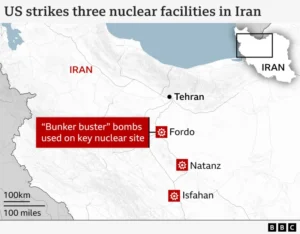Iran’s Supreme Leader Declares US Strikes “Achieved Nothing Significant” on Nuclear Program
Ayatollah Ali Khamenei, Iran’s Supreme Leader, has publicly asserted that recent US strikes on Iranian nuclear facilities were a failure, achieving “no achievements” and failing to “accomplish anything significant” to disrupt Iran’s nuclear program. This marks his first public address since a ceasefire with Israel was agreed upon earlier this week. Khamenei also characterized Iran’s retaliation against a US air base in Qatar as a “heavy blow” and threatened further strikes on US bases in the Middle East if Iran is attacked again, declaring victory over both Israel and the US.

These claims stand in stark contrast to Washington’s assessment of the strikes. US Defense Secretary Pete Hegseth stated on Thursday that intelligence indicated the operation “significantly damaged the nuclear programme, setting it back by years” and that enrichment facilities were “rendered inoperable.” He emphasized that the mission was a “historic success.” Previously, US President Donald Trump had claimed the strikes “totally obliterated” three key nuclear sites in Iran and reacted angrily to reports suggesting less extensive damage. Hegseth also noted that the US was “not aware of any intelligence” indicating that enriched uranium had been moved out of Fordo, a deeply buried facility targeted by “buster bombs,” prior to the strikes.
Khamenei’s televised address on Thursday morning broke a week-long public silence, during which he was reportedly sheltering in a bunker. Iranian authorities did not disclose his location, though a senior official confirmed he was in a safe place.
The direct conflict between Iran and Israel began on June 13, following Israeli Prime Minister Benjamin Netanyahu’s assertion that Iran could “produce a nuclear weapon in a very short time.” This came a day after the global nuclear watchdog declared Iran in breach of its non-proliferation obligations for the first time in 20 years. Iran maintains its nuclear program is for civilian purposes.
In a related development on Thursday, Iran approved a parliamentary bill to end its cooperation with the International Atomic Energy Agency (IAEA), meaning it will no longer allow nuclear inspectors into its sites. The UN nuclear watchdog chief, Rafael Grossi, had indicated on Wednesday that Tehran might have moved much of its highly enriched uranium before the attacks.
During the 12 days of air attacks, Iran’s health ministry reported 610 fatalities, while Israeli authorities stated 28 were killed. The US became directly involved last weekend, striking facilities in Fordo, Natanz, and Isfahan, before President Trump sought to mediate a ceasefire.